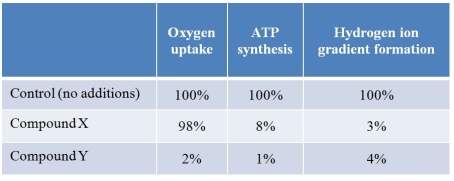Refer to the table below, showing data collected from experiments using purified soybean mitochondria incubated in buffer containing compound X, compound Y, or no additions.Three different assays were performed on each group of mitochondria to determine the rate of oxygen uptake, ATP synthesis, and formation of a hydrogen ion gradient.The results are expressed as a percentage relative to the control group.  Which conclusion is consistent with these results?
Which conclusion is consistent with these results?
Definitions:
Moral Philosophies
The study of fundamental principles regarding right and wrong or good and evil as they apply to conduct and character.
Self-Interest
An individual's personal gain or advantage, often motivating their actions and decision-making processes.
Egoism
A theory that suggests individuals should act in a way that is most beneficial to themselves, prioritizing their own interests.
Teleological Philosophies
Ethical theories focused on the outcomes or goals of actions to determine their morality, essentially aligning with consequentialism but with broader applications.
Q8: Refer to the figure below. <img src="https://d2lvgg3v3hfg70.cloudfront.net/TB5650/.jpg"
Q40: Water molecules labeled with <sup>18</sup>O were added
Q66: Refer to the figure below. <img src="https://d2lvgg3v3hfg70.cloudfront.net/TB5650/.jpg"
Q74: Refer to the graphs below. <img src="https://d2lvgg3v3hfg70.cloudfront.net/TB5650/.jpg"
Q78: Refer to the figure below. <img src="https://d2lvgg3v3hfg70.cloudfront.net/TB5650/.jpg"
Q85: Each diploid cell of a human female
Q106: In photosynthetic noncyclic electron transport, water is
Q155: When the pH of the stroma shifts
Q204: Photorespiration reduces the net carbon fixed by
Q205: Which is a metabolic pathway that links